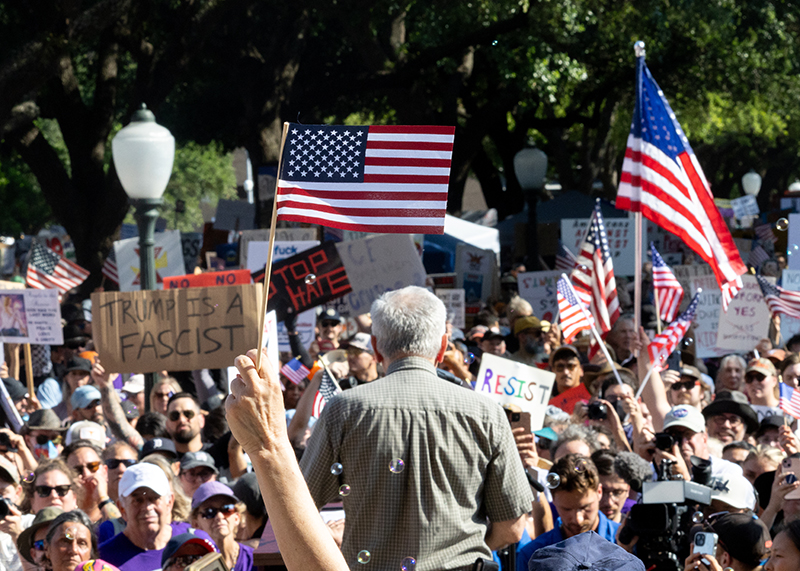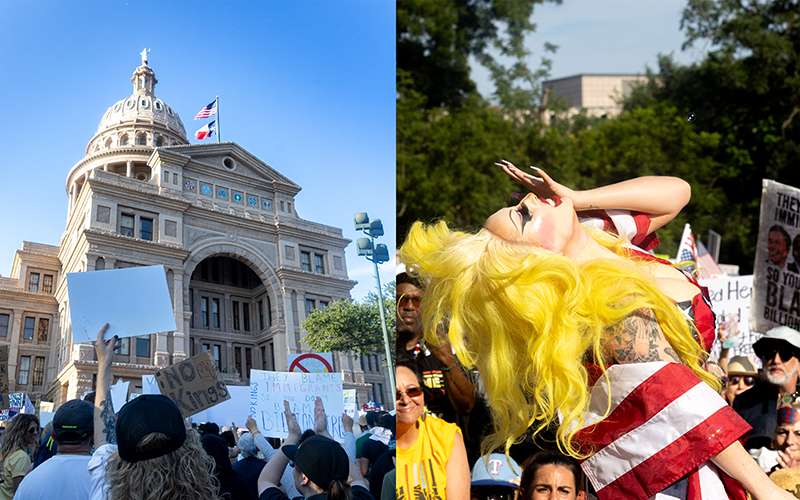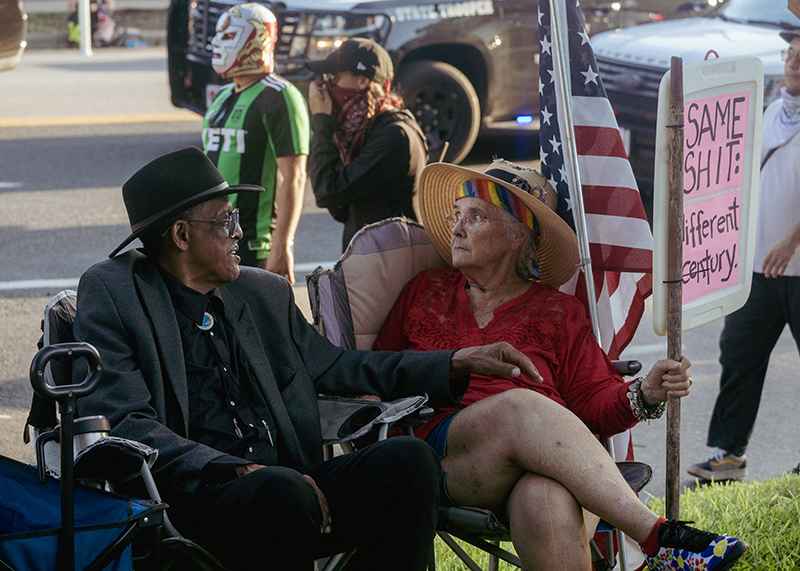As a Filipina immigrant who had to give up her citizenship to serve in the Army and help my family, I’m tired of fighting battles on multiple fronts.
That afternoon in Texas, the heat was sweltering, but we endured it.
It was the kind that clings to your skin and makes the air feel heavy. Yet, as I wiped my brow and looked around, I saw hundreds of people milling about the Texas State Capitol, seemingly undeterred by the sun’s merciless glare.
As the crowd grew, it became a shifting sea of bright, clever signs—today’s version of protest poetry—each one a sharp, humorous flag of defiance against the current status quo in the United States. I chuckled as I spotted a few taco-themed jabs at President Donald Trump’s tendency to back down from threats against other countries. “Trump Always Chickens Out,” people say—hence, T.A.C.O.
The “No Kings” rally, held on June 14, 2025, was the first demonstration I ever attended. Organized by the 50501 Movement, the protest was more than just a show of resistance—it was a national act of defiance against Trump’s increasingly destructive policies during his second term. The timing was deliberate, set to challenge the spectacle of Trump’s military parade in Washington, D.C., held that same day to mark both the Army’s 250th anniversary and his 79th birthday.
As an Army veteran, tired of being a pawn in the Republican Party’s political game, I showed up at the “No Kings” gathering here in Austin, Texas—fed up with the military parade and everything it stood for.

I migrated to the U.S. in 2017 during Trump’s first term.
I didn’t come here to chase the elusive American dream, but to start a life with my then-fiancé.
Back home in Manila, I had a fulfilling career as a lifestyle journalist for publications at the forefront of culture coverage in our country. I also had experience as a corporate communications professional. But since my partner had an associate’s degree rather than a bachelor’s, we weren’t confident he would find a decent-paying job in the Philippines. We were naïve enough to think that, given my education and professional experience, I would have a good chance of reestablishing my career here.
Unfortunately, my partner lived in a small city in Louisiana, where I had the painful experience of being patronized and belittled because of my skin color and nationality. The job prospects were limited, and the pay was low.
My mother-in-law worked as a veterinarian, and her boss once suggested that I could clean kennels at their animal clinic. I was deeply insulted. My mother hadn’t broken her back to give me a good education, and I hadn’t worked hard to build a strong portfolio, only to have my qualifications so casually dismissed.
I know some would argue that I shouldn’t have been so picky — that plenty of highly skilled Filipino professionals who moved to the U.S. had to take jobs they were overqualified for just to get by. But I’ve always carried a deep pride in myself and in my Filipino identity. I refused to diminish myself to fit into a society that too often sees brown immigrants as second-class.
It took me over a year to find employment, and only because my partner’s company happened to be hiring an administrative assistant. I excelled in the role and earned the respect of our clients, my supervisors, and the company’s owner. But as the months went by, I found myself growing more and more depressed. My husband and I made very little money between us, which kept us from moving out of his parents’ house.
More than anything, I missed my flourishing career in journalism and communications. I felt so trapped.
What finally broke the camel’s back was when our car broke down on our way to work. My husband and I scrambled to a car dealer to purchase a vehicle that we could barely afford. All this time, we kept our bosses informed on everything that was going on. They never responded to us, but we didn’t think anything of it because we were trying to get the purchase — which took up an entire day — over with.
When we returned to work the next day, our bosses pulled us aside and harshly reprimanded us, insisting that a broken car was not an excuse to miss work and that we should have taken an Uber. At the time — and even now — Uber didn’t operate in the area we lived in.
The final insult came when the owner said I was privileged to work for him. In that moment, the racism surfaced like an alligator lurking beneath the bayous Louisiana was known for, trying to snap through my self-worth and tear it to pieces.
What he didn’t know was I harvest my victories from the very spite meant to break me; each one a quiet rebellion stitched together by the strength people like him try to deny me. That moment was the catalyst for my decision to serve in the military.
I enlisted in the Army as a military pay specialist in 2019. I was assigned to Schofield Barracks, Hawaii — a tropical paradise that stood in stark contrast to the steamy marshes and dense, tangled wetlands of Louisiana.
It was a breath of fresh air. Back in Louisiana, I was constantly racially profiled almost wherever I went. In Honolulu, I blended in with the crowd. This might sound counterintuitive, but feeling invisible felt like freedom — freedom from the lingering looks and the casual racism I had grown used to enduring in Louisiana.
The start of my Army service unfolded against the backdrop of the COVID-19 pandemic and the 2020 U.S. election. During that time, a few of my colleagues expressed support for Trump, reasoning that “a Republican in the White House is always good for the military.”
When I asked them to explain, they pointed to the party’s reputation for boosting the defense budget, which, in their view, meant higher pay and better allowances for service members.
If only that were true. Most increases in the defense budget flow to private contractors, research and development, and weapons procurement. In 2023, RAND published a study finding that around 28.5% of active-duty service members faced food insecurity. Despite service members receiving housing and food allowances, these funds often fall short of covering the true cost of living, especially for those who have families.
My husband and I were so anxious about finding adequate housing for us and for our future kids. We didn’t want on-base housing because those frequently came with maintenance issues, delayed repairs, and structural problems.
We decided to rent an apartment off-base, and it turned out to be a quiet blessing — we had a structurally sound refuge that came with reasonable rent and a landlord who treated us well. Many service members aren’t as fortunate; soaring rents and fierce competition for every vacancy turn the search for a home into a battle of its own. I remember a soldier renting a smaller apartment just across from us, paying hundreds of dollars more than we did for ours.
Housing and food insecurity also affect junior enlisted troops living in barracks and relying on dining facilities on military bases. In 2023, the Government Accountability Office (GAO) published a report exposing substandard conditions in barracks, including infestations of mice and roaches, as well as the presence of black mold.
Dining facilities on military bases have also come under scrutiny for poor service and lack of transparency about how funding for junior enlisted members’ meals is being used. In late 2024, reports of undercooked food, limited balanced meal options, and nonoperational dining facilities began to surface.
After my enlistment contract expired in 2023, I used my education benefits to pursue my master’s in journalism. I was accepted to both the University of Florida and the University of Texas at Austin. At the time, Florida Gov. Ron DeSantis was drawing national scrutiny for a series of controversial policies, including bans on diversity, equity and inclusion (DEI) programs in public universities, widespread book removals from school libraries, and legislation targeting LGBTQ+ rights.
I knew I wouldn’t feel safe in Florida, so I chose to attend the University of Texas at Austin, a campus located in a city widely known for its liberal politics, vibrant social justice activism, and progressive local policies — despite being in a state led by Gov. Greg Abott, whose agenda closely mirrors that of Gov. DeSantis.
As I progressed through graduate school, I developed a deep appreciation for Austin’s diverse culture. With 8 tattoos and a couple of nose piercings, I found a city that welcomed self-expression and inclusivity, allowing me to feel truly at home.

But the 2024 election shattered that sense of security, with Trump’s (allegedly contentious) victory and the rising tide of “anti-woke” sentiment among “Make America Great Again” (MAGA) supporters of the president. The harsh truth hit me hard on the first day of my spring 2024 semester, when Immigration and Customs Enforcement (ICE) agents were stationed at the outskirts of our campus, targeting and harassing brown students.
Then came reports of U.S. citizens getting mixed up in the mess. One veteran was detained because ICE agents decided his veteran ID was fake, and he didn’t have his birth certificate to prove his citizenship. Even Native Americans, whose ancestors lived on this land long before anyone else arrived, weren’t spared. It was a painful reminder of who Trump and his supporters choose to see as “American,” and who isn’t.
I now have a contingency plan for if ICE kidnaps me. I shouldn’t even have to do this as an American citizen who served in the military.
The U.S. is a nation built on migration — some of it voluntary, like with the Puritans and other Europeans settlers seeking new beginnings, and some of it forced, like with the millions of Africans violently uprooted and brought here through the inhumane system of slavery.
This complicated foundation is part of the country’s identity, and it’s why immigration continues to be vital today. Whether the MAGA crowd likes it or not, the truth is that every new wave of migrants brings fresh perspectives and skills that help drive a country forward. It was what made America great in the first place.
Immigrants don’t drain resources — they strengthen the U.S. economy by contributing billions of dollars through home ownership, taxes, and entrepreneurship. They help keep essential services afloat and fill critical gaps in fields like STEM, healthcare, and agriculture.
Meanwhile, migrants who cross the border are often exploited by their American employers, subjecting them to extremely low wages, wage theft, and unsafe working conditions. These individuals are among the most hardworking people in this country who always endure challenges without complaint. Some simply want to work and send money back to their families. Others seek asylum from political persecution. A few are just trying to escape a death sentence for being a targeted minority (like queer people.)
They are not the criminals Trump and the Republican Party portray them to be. Those leaders should take a long, hard look in the mirror before projecting blame onto migrants working hard to have a better life. Let’s not forget: Trump was convicted of 34 felonies, and the members of the Republican Party have been the subject of serious allegations, including investigations related to sex trafficking and other crimes.
Just when I thought this administration couldn’t target any other part of my identity anymore, Trump started issuing executive orders affecting the veteran community. From mass layoffs at the Department of Veterans Affairs — with Trump firing more veterans than any president in history — to proposals cutting critical benefits like disability compensation and health care, the damage runs deep.
As a disabled veteran, I know this harm firsthand. One of the few benefits I’m entitled to is health insurance coverage for my family through CHAMPVA. I submitted their enrollment over two years ago. We’re still waiting for their insurance cards, which means my loved ones are locked out of care in a health care system that’s already failing too many Americans. I was fighting this battle long before Trump gutted VA staffing; his cuts only made a broken system even more impossible to navigate.
To make matters worse, the Senate Republican majority recently voted down a proposal to expand benefits for toxic-exposed veterans and their families — the very people the PACT Act, signed by President Biden in 2022, was supposed to protect.
The Republican Party talks a big game about honoring service members and veterans, but their actions tell a story of betrayal that should no longer be overlooked or excused. It makes my skin crawl whenever MAGA supporters loudly declare their “undying love” for the military, knowing full well they voted for the very policies harming our community.
As an immigrant Filipina who had to give up her Filipino citizenship to serve in the Army, I am tired of fighting battles on multiple fronts.

Now, I’m also a mother of mixed-race children, and I live in a constant state of fear for their safety in a world where their heritage can make them targets of relentless bullying at school, or worse, of the kind of violence that has become all too common in American classrooms where guns seem to matter more than children.
Despite my growing exhaustion, my disdain for the state of this country has only deepened. I often point out to anyone who will listen that in the Philippines, we managed to oust two presidents through the peaceful People Power Movement. Ironically, we were taught in school to revere American democracy as the global ideal—yet here I am, watching the U.S. struggle with the same authoritarian threats it once condemned.
If South Koreans could expose and shut down secret martial law plans quietly drafted by military leaders during President Park Geun-hye’s fall from power, why can’t so-called American patriots—who claim to stockpile arms to resist tyranny—stand up to authoritarianism in their own country?
It was time to put my words into action, so I joined the crowd at the “No Kings” rally. Standing alongside others who, like me, have had enough. The demonstration remained peaceful, but the undeniable presence of the simmering frustration bubbling among the attendees was hard to miss.
The crowd consisted of people from all walks of life and ages: there were families, self-proclaimed “woke” grandmothers resistant to the conservatism rampant in their generation, protesters of every race and sexual orientation. Seeing so many veterans also showing solidarity gave me real hope that more of my brothers and sisters in arms are waking up to the farce.
We were 20,000 strong beneath the Texas sun, each voice adding to the growing chorus of resistance.
“Texas, the promise of America isn’t dead, but it is demanding, as you all are doing right now, that we show up,” State Rep. John Bucy III said as the crowd cheered. “Patriotism isn’t waving a flag while the Constitution burns behind you. It’s standing in the flames and fighting to put them out.”
The “No Kings” protest drew the largest demonstration in U.S. history, with an estimated 12 million people taking to the streets in towns and cities across the country. This nationwide display of resistance was more than a protest; it was a declaration that we will no longer accept cruelty and injustice. As citizens, we refuse to be expendable pieces in Trump’s political theater.
This movement is proof that when people come together, when we refuse to be silenced, real change can be attainable. I’m proud to have stood with my fellow Austinites, demanding justice and equality for all.
I carry the hope that this is only the beginning of a bigger mobilization to hold Trump and his cronies accountable for their unconstitutional actions. The days may be sweltering, the air may be heavy, and it may not be safe for some of us, but like many veterans, migrants, and women who have earned our place in this country, we’ve been put through worse.



